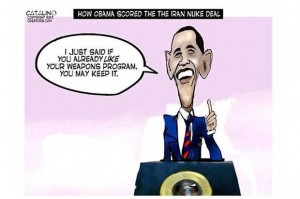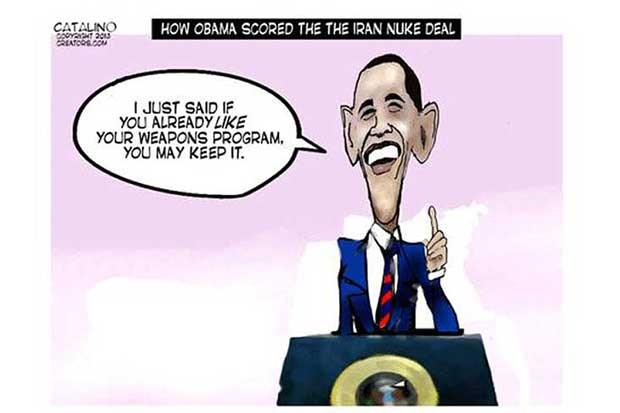The Iran nuclear deal has the same political weaknesses as the Affordable Care Act.
By Daniel Henninger • Wall Street Journal
 The Iran nuclear deal is going to be the ObamaCare of arms-control agreements—a substantive mess undermined by a failure to build adequate political support.
The Iran nuclear deal is going to be the ObamaCare of arms-control agreements—a substantive mess undermined by a failure to build adequate political support.
Next Tuesday is the deadline for completing the “political” terms of an agreement with Iran. “Technical” details arrive in June. From news reporting on the negotiations, it appears the agreement is turning into a virtual Rube Goldberg machine, a patchwork of fixes that its creators will claim somehow limits Iran’s nuclear breakout period to “a year.” Which is to say, it’s going to be another ObamaCare, a poorly designed mega-project others will have to clean up later.
Just as ObamaCare was a massive entitlement program enacted with no Republican support (unlike Social Security, Medicare and Medicaid), the administration’s major arms-control agreement is bypassing a traditional vote in the Senate. Instead, it will get rubber-stamp approval by, of all things, the U.N. Security Council.
Can anyone feign surprise that this has produced a political reaction in the Senate? The heavily bipartisan Corker-Menendez bill, which would require the deal to be submitted to Congress and which the White House has denounced, is a few votes away from a veto-proof majority.
Political legitimacy is the coin of the realm in the American system. It is why every U.S. president in the postwar era, except this one, has worked so hard to assemble opposition support for his projects. Without it, any initiative will remain politically vulnerable.
In a letter last weekend to Sen. Bob Corker, chairman of the Foreign Relations Committee, White House Chief of Staff Denis McDonough doubled down on Barack Obama’s general theory of American politics—my way or the highway. He wrote that other arms agreements haven’t gone through the Senate and that Mr. Corker and his Senate colleagues should step away from the Iran deal.
In fact, Presidents Kennedy, Nixon and Reagan all submitted major arms-control treaties and agreements for Senate approval. They did so to give their work political credibility with the American people and indeed the world. But somehow Mr. Obama believes he has an exemption from the basics of U.S. politics. So we wake up one day to find he is substituting the judgment of the Security Council, with such famous allies as Russia and China, for consent from the U.S. Senate. Result: an arms deal as politically flaccid as ObamaCare.
After the Affordable Care Act became a one-party law, many governors refused to participate. A mirror-image opt-out from the Iran deal is emerging now among the most significant nations of the Middle East.
Earlier this week, Prince Turki al-Faisal, Saudi Arabia’s former intelligence chief, told the BBC, “I’ve always said whatever comes out of these talks, we will want the same.” He wasn’t talking about forsaking the nuclear option. Elaborating, he said, “If Iran has the ability to enrich uranium to whatever level, it’s not just Saudi Arabia that’s going to ask for that. The whole world will be an open door to go that route without any inhibition.” By the “whole world” he of course means Egypt, Turkey, Jordan and the United Arab Emirates. Are all these countries opposed to the Iran deal because they “hate Obama?”
On March 5 at the deal’s 11th hour, Secretary of State John Kerry flew to Saudi Arabia to reassure King Salman about the Iran deal, which is at least more time than Mr. Obama gave doubting U.S. governors on his health-care plan. The result was the same: no political buy-in. Emirates commentator Mishaal al-Gergawi told The Wall Street Journal: “A lot of the Gulf countries feel they are being thrown under the bus.” Welcome to the club.
Whether in domestic or foreign policy, Mr. Obama’s modus operandi is the same: Structure the issue as a choice between what he wants to do and an unacceptable extreme. The result, not surprisingly, is to choke off any possibility of building useful political coalitions from the outset.
With health care, the whole of GOP alternatives was “nothing new.” With Iran, it’s Mr. Obama’s deal or a “rush to war.” You get two political options: Salute or shut up.
As important as the constitutional issues raised by Mr. Obama’s unilateral authority is the political damage he has done to traditional relationships between the presidency and the institutions his methods have marginalized.
The Obama presidency has sucked the oxygen out of politics in Washington and indeed the world. But politics abhors a vacuum. The Senate letter to Iran more than anything is the system bursting outside its normal channels. Desperate Ukraine, abandoned to Russia by the U.S., has pathetically asked the U.N. to send blue-helmeted peacekeepers to eastern Ukraine.
No serious person can be shocked if what happens after the Iran nuclear agreement looks a lot like the ObamaCare rollout—a shambles of half-done details. With ObamaCare, America’s courts and bureaucracies are available to clean up the mess. But you may not like the cleanup crew that shows up for the ObamaCare of arms-control deals.
